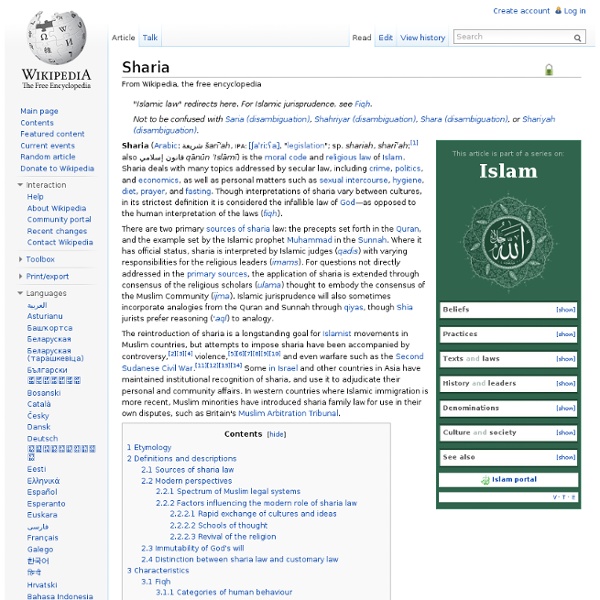Sharia
To Arabic-speaking people, sharia (shariah, shari'a, sharīʿah; Arabic: شريعة šarīʿah, IPA: [ʃaˈriːʕa], "legislation"),[1] also known as Islāmī qānūn (اسلامی قانون), means the moral code and religious law of a prophetic religion.[2][3] In English usage, the term "sharia" has been largely identified with Islam.[4] Sharia deals with many topics addressed by secular law, including crime, politics, and economics, as well as personal matters such as sexual intercourse, hygiene, diet, prayer, everyday etiquette and fasting. Though interpretations of sharia vary between cultures, in its strictest and most historically coherent definition it is considered the infallible law of God—as opposed to the human interpretation of the laws (fiqh).[5] However, historically, much of Sharia has been implemented in its strictest understanding. Etymology and origins[edit] History[edit] The Umayyads initiated the office of appointing qadis, or Islamic judges. Definitions and descriptions[edit]
Istihsan
Istihsan (استحسان) is an Arabic term for juristic "preference". In its literal sense it means "to consider something good". Muslim scholars may use it to express their preference for particular judgements in Islamic law over other possibilities. It is one of the principles of legal thought underlying personal interpretation or ijtihad. A number of disputes existed amongst the classical jurists over this principle with the Hanafite jurists adopting this as a secondary source. Etymology[edit] Istihsan (استحسان [istihsan], plural []) is an Arabic word that means "to consider something good". Bazdawi defines it as moving away from the implications of an analogy to an analogy that is stronger than it[2]Al-Halwani defines it as giving up an analogy for a stronger evidence from the Quran, Sunnah or ijma[3]The Maliki jurist, Ibn al-Arabi defines it as sacrificing some of the implications of an evidence by way of exception[4] Types of Istihsan[edit] Examples of Istihsan[edit] Criticisms[edit]
Ilm al-Kalam
ʿIlm al-Kalām (Arabic: علم الكلام, literally "science of discourse"[1]), often foreshortened to kalām, is the practice in Islamic philosophy of seeking theological principles through dialectic, debate and argument. A scholar of kalām is referred to as a mutakallim (plural mutakallimūn). There are many possible interpretations as to why this discipline was originally called "kalām"; one is that the widest controversy in this discipline has been about whether the Word of God, as revealed in the Qur'an, can be considered part of God's essence and therefore not created, or whether it was made into words in the normal sense of speech, and is therefore created. One of the earliest deviated systematic theological school to develop was Mu'tazila, in the mid 8th century. Mu'tazila emphasized reason and rational thought, positing that the injunctions of God are accessible to rational thought and inquiry. Criticism[edit] Major Kalām schools[edit] See also[edit] References[edit] External links[edit]
Al-Hidayah (book)
Al-Hidayah fi Sharh Bidayat al-Mubtadi'' (d. 593 AH/1197 CE) (Arabic: الهداية في شرح بداية المبتدي, al-Hidāyah fī Sharḥ Bidāyat al-Mubtadī), commonly referred to as al-Hidayah The Guidance, is a 12th-century Hanafi juridical work by Shaykh al-Islam Burhan al-Din al-Farghani al-Marghinani that is considered an authoritative guide to fiqh among Muslims throughout the world, based on Mukhtasar of Al-Quduri Islamic law. [1] [2] The Hidayah represents the refined distilled and authentic version of a legal tradition developed over many centuries. It presents the corpus of Hanifi law in its approved and preferred form and forges an organic link with the other schools of law. There is no book that can match the power of al-Hidayyah as a teaching manual. Education in Islamic law is not complete without this book. Accordingly, each and every Islamic seminary, whatever its affiliation, imparts instruction in Islamic law through al-Hiddayah. "sound and reliable... clear and lucid.
Related:
Related:



